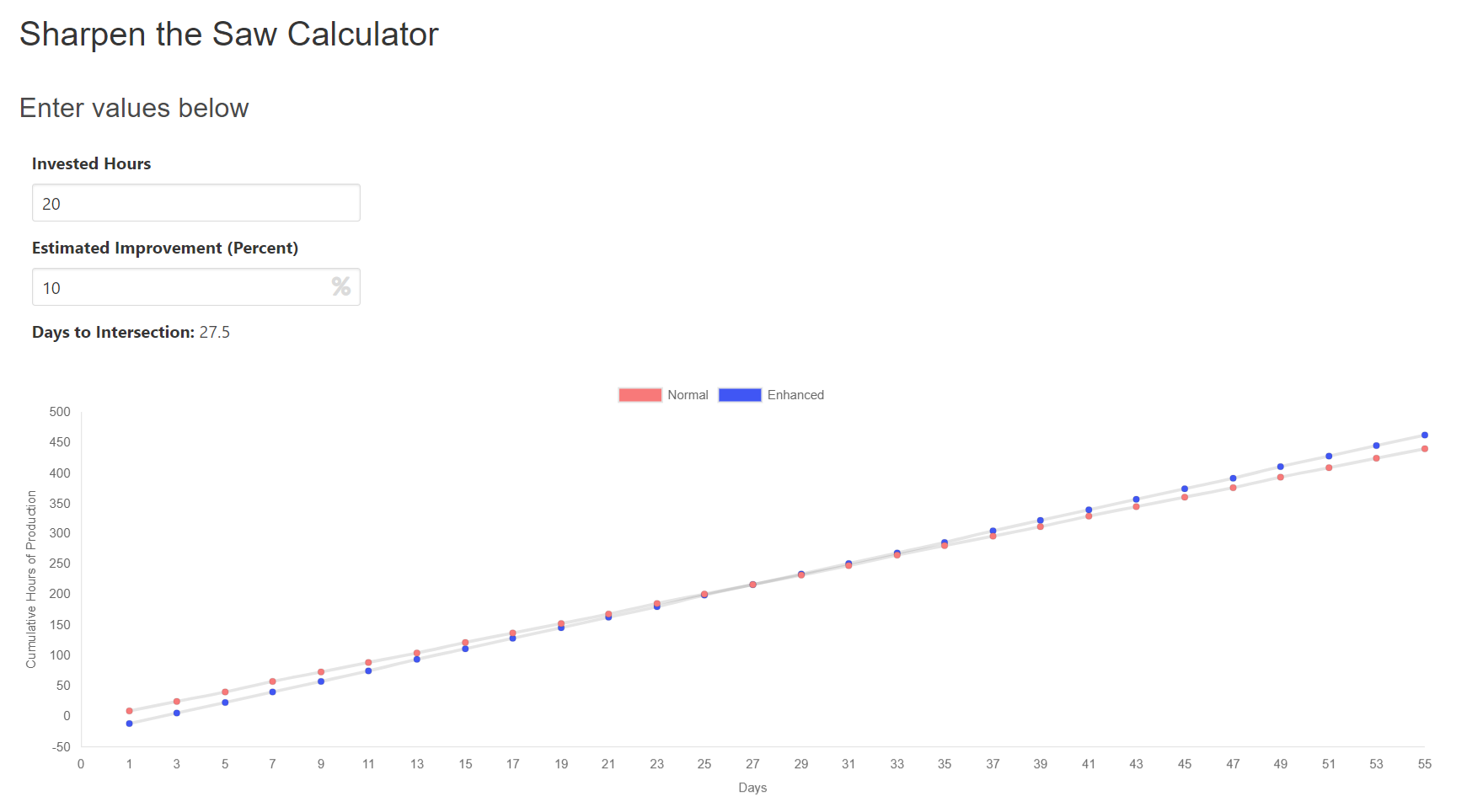How Much Time Should You Invest in Training
“Give me six hours to chop down a tree and I will spend the first four sharpening the ax.”
- Not actually Abraham Lincoln
This quote has almost become cliché but I constantly see that, by and large, its message is being ignored.
I am laying out a framework to aid decisions around whether training is worth it and at exactly what point is it worth it.
Objectively Correct
In Stephen Covey’s 7 Habits of Highly Effective People the final habit is “Sharpen the Saw”. While this concept’s scope is larger than what I am describing, it lays out the importance of ways to keep yourself sharp and the advantages of doing so.
It is my intent to make continuous learning and improvement an objectively correct choice rather than a subjectively ambiguous choice.
Scenarios
Context: these examples and questions are taken from personal experience and study largely in the startup domain and more specifically coding, but they apply to any field that can be measured.
- You want to take a new course. It’s estimated at 20 hours. You estimate this will bring about a 10% improvement in your speed of coding. When is it worth it?
- It takes you 2 hours a day to respond to emails. Is there a way to remove this process completely or train someone else to do it for you? Assume that it will take you 20 hours to either automate or delegate with training.
- Google AdWords training courses are 20 hours of video and an estimated 50 hours of total training time. Studies show that the training often results in 100% increase in advertising revenue.
The Elephant in the Room: Margin of Error
I want to acknowledge that in every example I gave the “improvement” was estimated or guessed.
Improvement can never be that precise, but you can measure.
You can find a metric that relates to your performance and you can measure its change over time. If you are managing a team, you can do a controlled study (i.e. splitting 30 people into two groups of 15, half of which go to a conference). In order to have value in the calculator (see below) you either need to measure the results or acknowledge that other variables can interfere with results.
Calculator
I created a calculator to make it easy to see when something pays off. It assumes 8 hours a day.
The first example above, charted:

In this example, it takes 27.5 days before your invested time is paid off. Every day after you profit. Theoretically, forever.
A false conclusion; or, where this goes wrong
“I should just spend all my time learning.” That’s what school was for. Now, you likely have deadlines. In the example above, if you had 15 days to accomplish a project that relied on the course that took 27.5 before you broke even and crossed that line, it wouldn’t have worked.
The choice in metric matters
Does what you’re improving make a difference?
If I can increase my typing speed from 120 WPM to 150 WPM (25% improvement!) with a 50-hour course, it will take me 31 days to “payoff” my invested time. I would argue that, except in very rare cases, this will not produce an important change.
Pareto principle (80/20 rule)
The Pareto principle amplifies this rule drastically. Taking one of the above scenarios, Google Adwords, consider the following:
- Most likely the majority of what you need to run a successful campaign is in the first 20% of the course(10 hours instead of 50)
- You get 80% of the original benefit (80% of the 100%)
- It now takes 2.9 days to get most of the benefit (rather than the previous 12.5 days)
Summary
The framework is as follows:
- Calculate the hours needed/asked for
- Choose a metric that is impactful
- Estimate % improvement to be gained
- Calculate intersection
- Compare intersection with any deadlines, and objectively decide on a course of action
This is my framework for deciding what workshops employees should attend when I need to delegate a task, or how much time I need to spend to give new tools or experiments a “real shot”.
I hope it is useful for you.